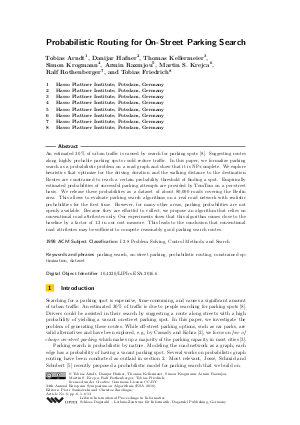Probabilistic Routing for On-Street Parking Search
Authors Tobias Arndt, Danijar Hafner, Thomas Kellermeier, Simon Krogmann, Armin Razmjou, Martin S. Krejca, Ralf Rothenberger, Tobias Friedrich
-
Part of:
Volume:
24th Annual European Symposium on Algorithms (ESA 2016)
Part of: Series: Leibniz International Proceedings in Informatics (LIPIcs)
Part of: Conference: European Symposium on Algorithms (ESA) - License:
 Creative Commons Attribution 3.0 Unported license
Creative Commons Attribution 3.0 Unported license
- Publication Date: 2016-08-18
File

PDF
LIPIcs.ESA.2016.6.pdf
- Filesize: 5.04 MB
- 13 pages
Document Identifiers
Subject Classification
Keywords
- parking search
- on-street parking
- probabilistic routing
- constrained optimization
- dataset
Metrics
- Access Statistics
-
Total Accesses (updated on a weekly basis)
0Document
0Metadata
Abstract
An estimated 30% of urban traffic is caused by search for parking spots [Shoup, 2005]. Suggesting routes along highly probable parking spots could reduce traffic. In this paper, we formalize parking search as a probabilistic problem on a road graph and show that it is NP-complete. We explore heuristics that optimize for the driving duration and the walking distance to the destination. Routes are constrained to reach a certain probability threshold of finding a spot. Empirically estimated probabilities of successful parking attempts are provided by TomTom on a per-street basis. We release these probabilities as a dataset of about 80,000 roads covering the Berlin area. This allows to evaluate parking search algorithms on a real road network with realistic probabilities for the first time. However, for many other areas, parking probabilities are not openly available. Because they are effortful to collect, we propose an algorithm that relies on conventional road attributes only. Our experiments show that this algorithm comes close to the baseline by a factor of 1.3 in our cost measure. This leads to the conclusion that conventional road attributes may be sufficient to compute reasonably good parking search routes.
Cite As Get BibTex
Tobias Arndt, Danijar Hafner, Thomas Kellermeier, Simon Krogmann, Armin Razmjou, Martin S. Krejca, Ralf Rothenberger, and Tobias Friedrich. Probabilistic Routing for On-Street Parking Search. In 24th Annual European Symposium on Algorithms (ESA 2016). Leibniz International Proceedings in Informatics (LIPIcs), Volume 57, pp. 6:1-6:13, Schloss Dagstuhl – Leibniz-Zentrum für Informatik (2016)
https://doi.org/10.4230/LIPIcs.ESA.2016.6
BibTex
@InProceedings{arndt_et_al:LIPIcs.ESA.2016.6,
author = {Arndt, Tobias and Hafner, Danijar and Kellermeier, Thomas and Krogmann, Simon and Razmjou, Armin and Krejca, Martin S. and Rothenberger, Ralf and Friedrich, Tobias},
title = {{Probabilistic Routing for On-Street Parking Search}},
booktitle = {24th Annual European Symposium on Algorithms (ESA 2016)},
pages = {6:1--6:13},
series = {Leibniz International Proceedings in Informatics (LIPIcs)},
ISBN = {978-3-95977-015-6},
ISSN = {1868-8969},
year = {2016},
volume = {57},
editor = {Sankowski, Piotr and Zaroliagis, Christos},
publisher = {Schloss Dagstuhl -- Leibniz-Zentrum f{\"u}r Informatik},
address = {Dagstuhl, Germany},
URL = {https://drops.dagstuhl.de/entities/document/10.4230/LIPIcs.ESA.2016.6},
URN = {urn:nbn:de:0030-drops-63489},
doi = {10.4230/LIPIcs.ESA.2016.6},
annote = {Keywords: parking search, on-street parking, probabilistic routing, constrained optimization, dataset}
}
Author Details
References
- Alan Agresti and Brent A. Coull. Approximate is better than "exact" for interval estimation of binomial proportions. The American Statistician, 52(2):119-126, 1998. URL: http://www.jstor.org/stable/2685469.
-
C Richard Cassady and John E Kobza. A probabilistic approach to evaluate strategies for selecting a parking space. Transportation Science, 32(1):30-42, 1998.

-
Simon Evenepoel, Jan Van Ooteghem, Sofie Verbrugge, Didier Colle, and Mario Pickavet. On-street smart parking networks at a fraction of their cost: performance analysis of a sampling approach. Transactions on Emerging Telecommunications Technologies, 25(1):136-149, 2014.

- Ming Hua and Jian Pei. Probabilistic path queries in road networks: Traffic uncertainty aware path selection. In Proceedings of the 13th International Conference on Extending Database Technology, pages 347-358, 2010. URL: http://dx.doi.org/10.1145/1739041.1739084.
- Gregor Jossé, Klaus Arthur Schmid, and Matthias Schubert. Probabilistic resource route queries with reappearance. In Proceedings of the 18th International Conference on Extending Database Technology, pages 445-456, 2015. URL: http://dx.doi.org/10.5441/002/edbt.2015.39.
- Yaron Kanza, Eliyahu Safra, and Yehoshua Sagiv. Route search over probabilistic geospatial data. In Proceedings of the 11th International Symposium on Advances in Spatial and Temporal Databases, pages 153-170, 2009. URL: http://dx.doi.org/10.1007/978-3-642-02982-0_12.
- Eliyahu Safra, Yaron Kanza, Nir Dolev, Yehoshua Sagiv, and Yerach Doytsher. Computing a k-route over uncertain geographical data. In Proceedings of the 10th International Conference on Advances in Spatial and Temporal Databases, pages 276-293, 2007. URL: http://dl.acm.org/citation.cfm?id=1784462.1784478.
-
Donald Shoup. The High Cost of Free Parking. APA Planners Press, 2005.

